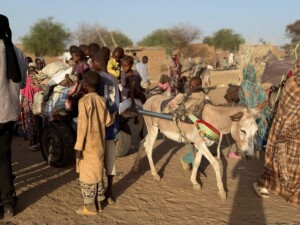PM Hamdok: ‘I will resign if political agreement does not serve the interests of Sudan’s people’
Sudan’s Prime Minister Abdallah Hamdok, has said that he will tender his resignation if the Sudanese people see that the political agreement, signed in Khartoum on Sunday with coup leader Gen Abdelfattah El Burhan, does not serve their interests.
 Web flyer publicising media seminar (Photo: Prime Minister’s Office)
Web flyer publicising media seminar (Photo: Prime Minister’s Office)
Sudan’s Prime Minister Abdallah Hamdok, has said that he will tender his resignation if the Sudanese people see that the political agreement, signed in Khartoum on Sunday with coup leader Gen Abdelfattah El Burhan, does not serve their interests.
The agreement resulted in the reinstatement of Hamdok – who had been under house arrest since the coup – and return the country to democratic transition in terms of the Constitutional Document. The agreement also stipulates the release of all political detainees, an investigation into the events that took place during the demonstrations, including injuries and deaths among civilians and soldiers, and to bringing those involved to justice.
In a media seminar broadcast by Sudaniya 24 yesterday, Hamdok defended the agreement and said that it came within the framework of the possible, and aims to spare the country the risks of slipping into the Yemeni and Syrian model and turning into a civil war.
He explained that if the terms of the agreement are strictly implemented, it will prevent bloodshed and preserve the right to demonstrate. He added, “The agreement came within the framework of the possible… it may be incomplete, but there are many positives that could open the way for its development,” he said.
Hamdok pledged: “If the Sudanese people think that the agreement does not meet their interests, I will submit my resignation.” He promised to protect the executive body from interference and said that he would also resign if he felt unable to do so.
‘The political agreement aims to spare the country the risks of slipping into a civil war’ – PM Abdallah Hamdok
On justice issues, Hamdok affirmed the continuation of achieving justice in a manner that achieves the full satisfaction of the people of Darfur with the implementation of direct and transitional justice. He explained that the new government will build on what was achieved in the Declaration of Principles signed with the Sudan People’s Liberation Movement-North (SPLN-N) under the leadership Abdelaziz El Hilu in Juba in March.
He stressed that the formation of a unified army and the absorption of armed movements will help to get the country out of the current crisis. He also explained that the mandate of the Ministry of Finance over public money is important, as “it is the pillar upon which the unified army is built”.
He acknowledged the great economic impact of the coup on the economy of delayed remittances from abroad, and assured that “the remainder of the transitional period will focus on issues of the economy, peace, and security, leading to free and fair elections after 18 months”.
To that, Hamdok issued a directive to immediately suspend dismissal and appointments to the civil service in all government units at the national and state levels until further notice. He also directed that appointments and dismissals made during the past period be subject to study, evaluation, and review.
Hamdok said that he will take time to implement the appointment review order, and called on parties not to politicising the public service.











 and then
and then